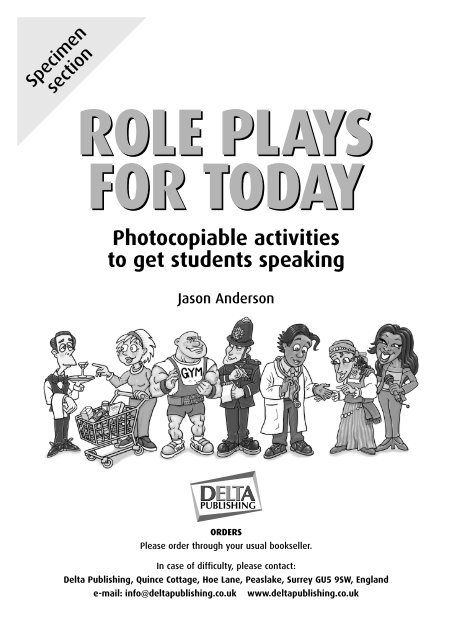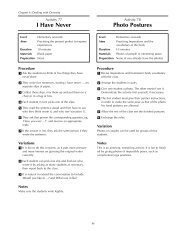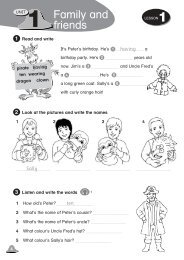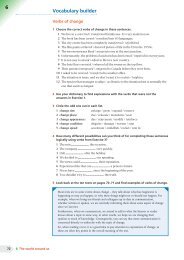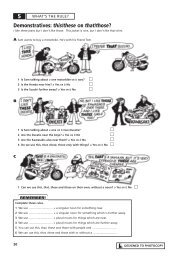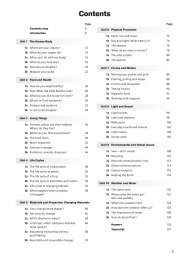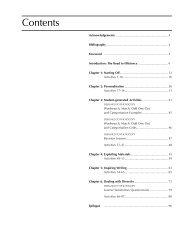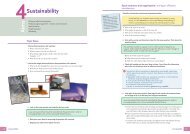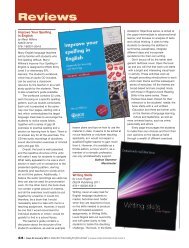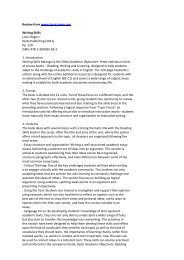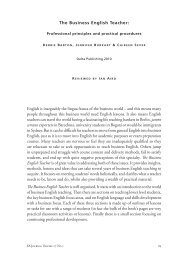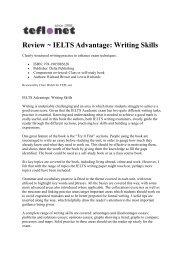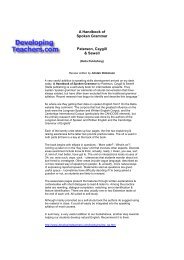Role Plays for Today - Delta Publishing
Role Plays for Today - Delta Publishing
Role Plays for Today - Delta Publishing
Create successful ePaper yourself
Turn your PDF publications into a flip-book with our unique Google optimized e-Paper software.
Specimen<br />
section<br />
ROLE PLAYS<br />
FOR TODAY<br />
Photocopiable activities<br />
to get students speaking<br />
Jason Anderson<br />
DELTA<br />
PUBLISHING<br />
ORDERS<br />
Please order through your usual bookseller.<br />
In case of difficulty, please contact:<br />
<strong>Delta</strong> <strong>Publishing</strong>, Quince Cottage, Hoe Lane, Peaslake, Surrey GU5 9SW, England<br />
e-mail: info@deltapublishing.co.uk www.deltapublishing.co.uk
Contents<br />
Introduction page vi<br />
Elementary<br />
Pre-int<br />
Levels<br />
Intermediate<br />
Upper int<br />
Advanced<br />
<strong>Role</strong> Play and description Grammar Functions Vocabulary<br />
1 Services Practical, leisure and travel<br />
1a Tourist in<strong>for</strong>mation office<br />
Assistant and tourist<br />
page 2<br />
● ● ●<br />
Imperatives<br />
Will <strong>for</strong> general<br />
future predictions<br />
Giving directions<br />
Making<br />
recommondations<br />
Tourist attractions:<br />
cathedral, funfair<br />
Verbs of motion:<br />
go straight on,<br />
turn left<br />
1b Enrolling at a gym<br />
Instructor and new gym<br />
member<br />
page 4<br />
● ● ● ●<br />
Adverbs and<br />
questions of<br />
frequency<br />
Imperatives<br />
Giving polite<br />
commands<br />
Giving advice<br />
Fitness and health:<br />
muscles, pulse,<br />
Sports: athlete,<br />
sporty<br />
1c<br />
Post Office<br />
Customer and post office clerk<br />
page 6<br />
● ● ●<br />
Question <strong>for</strong>ms<br />
Making enquiries<br />
Shopping: post<br />
office, stamps,<br />
parcel, scales<br />
1d Visiting the Doctor<br />
Patient and doctor in surgery<br />
page 8<br />
● ● ●<br />
Should + verb<br />
Have got<br />
Describing how<br />
you feel<br />
Asking <strong>for</strong> and<br />
giving advice<br />
Health: illness, flu,<br />
runny nose, red<br />
eyes, temperature,<br />
stress<br />
1e Internet café<br />
Customer and café assistant<br />
page 10<br />
● ● ●<br />
Question <strong>for</strong>ms<br />
including indirect<br />
questions<br />
Making enquiries<br />
Getting help<br />
Computers:<br />
transfer photos,<br />
scan, broadband,<br />
type up<br />
1f<br />
Train station<br />
Customer and assistant at<br />
ticket office<br />
page 11<br />
● ● ●<br />
Present simple <strong>for</strong><br />
timetable future<br />
Buying tickets<br />
Making enquiries<br />
Transport: single,<br />
fare, ID, change<br />
at…<br />
1g Passport Control<br />
English student/tourist and<br />
immigration officer at airport<br />
page 12<br />
● ● ●<br />
Going to and<br />
present continuous<br />
<strong>for</strong> future<br />
arrangements and<br />
plans<br />
Expressing future<br />
arrangements<br />
Asking <strong>for</strong><br />
clarification<br />
Education: fees,<br />
course<br />
Accommodation:<br />
homestay, host<br />
family<br />
1h Airport check-in desk<br />
Passenger and check-in clerk<br />
page 14<br />
● ● ●<br />
Various – mixed<br />
tenses and<br />
question <strong>for</strong>ms<br />
Asking <strong>for</strong><br />
clarification<br />
Explaining difficult<br />
words<br />
Transport: plane<br />
travel, aisle, board,<br />
hand luggage<br />
1i<br />
Reporting a crime<br />
to the Police<br />
A victim of theft and<br />
police officer<br />
page 16<br />
● ● ●<br />
Asking indirect<br />
questions<br />
Past continuous<br />
Describing<br />
appearance<br />
Expressing degrees<br />
of certainty<br />
Physical<br />
appearance: face,<br />
clothes<br />
Crime: stole,<br />
criminal<br />
1j<br />
Checking into a hotel<br />
Guest and hotel receptionist<br />
page 18<br />
● ● ●<br />
Question <strong>for</strong>ms<br />
Making enquiries<br />
Hotels: double<br />
room, en suite<br />
bathroom<br />
ii
Elementary<br />
Pre-int<br />
Levels<br />
Intermediate<br />
Upper int<br />
Advanced<br />
<strong>Role</strong> Play and description Grammar Functions Vocabulary<br />
1k Complaining in a hotel<br />
Guest and hotel receptionist<br />
page 19<br />
● ● ● ●<br />
Will <strong>for</strong><br />
spontaneous<br />
decisions<br />
There is / are… <strong>for</strong><br />
describing rooms<br />
Complaining<br />
Providing excuses<br />
Apologising<br />
Hotels: wake-up call,<br />
guest, reduction<br />
1l<br />
Travel Agent<br />
Customer and travel agent<br />
page 20<br />
● ● ●<br />
Question <strong>for</strong>ms<br />
Making enquiries<br />
Clarifying details<br />
Travel / Holidays:<br />
excursion, flight<br />
Purchasing: per<br />
person, hire<br />
2 Shopping Supermarkets, clothes and restaurants<br />
2a Supermarket shopping<br />
Customer and supermarket<br />
shop assistant<br />
page 22<br />
● ● ●<br />
Countable and<br />
uncountable nouns<br />
Enquiring about<br />
products<br />
Food: fresh fish,<br />
bananas, eggs<br />
Shopping:<br />
supermarkets<br />
2b Clothes shop<br />
Customer and clothes shop<br />
assistant<br />
page 24<br />
● ● ●<br />
Demonstratives<br />
(those, these, that,<br />
this)<br />
Expressing personal<br />
preferences<br />
Paying compliments<br />
Clothes: jeans, top,<br />
shirt<br />
Shopping: buying<br />
clothes<br />
2c<br />
DIY shop<br />
Customer and DIY shop<br />
assistant<br />
page 26<br />
● ● ●<br />
Preposition +<br />
gerund<br />
Verb patterns<br />
Describing an<br />
object without<br />
its name<br />
(paraphrasing)<br />
Negotiating<br />
Shapes and<br />
materials: round,<br />
plastic<br />
Tools and<br />
hardware: pliers<br />
2d Shoe shop<br />
Customer and shoe shop<br />
assistant<br />
page 30<br />
● ● ●<br />
Too and enough<br />
Expressing<br />
satisfaction and<br />
dissatisfaction<br />
Clothes: suit, try on<br />
Shoes: sandals,<br />
high heels<br />
2e Traditional restaurant<br />
Group of friends and waiter<br />
page 31<br />
● ● ●<br />
Will <strong>for</strong> placing<br />
orders<br />
Indirect and direct<br />
question <strong>for</strong>ms<br />
Enquiring about<br />
dishes<br />
Complimenting<br />
food<br />
Complaining<br />
Food: peppers,<br />
stewed, pudding<br />
2f<br />
Fast Food restaurant<br />
Customer and assistant<br />
page 34<br />
●<br />
●<br />
Contracted<br />
question <strong>for</strong>ms<br />
Placing an order<br />
Complaining in a<br />
restaurant<br />
Food: fast food<br />
2g Out of stock<br />
Customer and electronics<br />
store assistant<br />
page 36<br />
●<br />
●<br />
Demonstratives vs.<br />
pronouns<br />
Reasoning with<br />
someone<br />
Making suggestions<br />
Apologising<br />
Purchasing<br />
products: model,<br />
refund<br />
Emotion adjectives:<br />
calm, annoyed<br />
iii
Elementary<br />
Pre-int<br />
Levels<br />
Intermediate<br />
Upper int<br />
Advanced<br />
<strong>Role</strong> Play and description Grammar Functions Vocabulary<br />
3 Social life Going out, friends and relationships<br />
3a A day out in London<br />
Goups of students decide<br />
how to spend the day<br />
page 38<br />
● ● ●<br />
Structures <strong>for</strong><br />
suggestions (Let’s;<br />
We could…?)<br />
Future <strong>for</strong>ms<br />
(going to)<br />
Making, accepting<br />
and refusing<br />
suggestions<br />
Free time: going<br />
out, live<br />
per<strong>for</strong>mance,<br />
exhibition<br />
3b Party strangers<br />
Two strangers introduce<br />
themselves<br />
page 40<br />
● ● ●<br />
Various<br />
Using <strong>for</strong>mal /<br />
in<strong>for</strong>mal registers<br />
Introducing yourself<br />
Showing interest<br />
Personal details<br />
Free time: interests<br />
In<strong>for</strong>mal English:<br />
naff, …and stuff<br />
3c<br />
Argument between friends<br />
Two friends argue outside a<br />
cinema<br />
page 42<br />
● ● ●<br />
Question tags<br />
Imperatives<br />
Making and<br />
refuting accusations<br />
Making up after an<br />
argument<br />
Free time: go out,<br />
nightclub, cinema<br />
3d Telephone phone-around<br />
Groups of students make<br />
plans <strong>for</strong> an evening out<br />
page 44<br />
● ● ●<br />
Present continuous<br />
and going to <strong>for</strong><br />
future arrangements<br />
and intentions; will<br />
<strong>for</strong> new decisions<br />
Making and<br />
declining<br />
suggestions<br />
Social events:<br />
go out, pub,<br />
restaurant, go<br />
clubbing<br />
3e Flatmates<br />
Flatmates decide how to<br />
share the housework<br />
page 46<br />
● ● ●<br />
Verb patterns<br />
(verb + gerund;<br />
verb + infinitive;<br />
preposition +<br />
gerund)<br />
Making suggestions<br />
Agreeing and<br />
disagreeing<br />
Housework and<br />
chores: vacuum<br />
the flat, do the<br />
washing up<br />
3f<br />
Breaking bad news<br />
Mark phones his friend Nicky<br />
page 48<br />
● ● ●<br />
Past simple<br />
Breaking bad news<br />
Sympathising<br />
Pets: feed, cage,<br />
rabbit<br />
3g Meeting old friends<br />
Class meet up again 10 years<br />
into the future<br />
page 50<br />
● ● ● ●<br />
Present perfect<br />
simple and<br />
continuous to<br />
describe changes<br />
Expressing surprise<br />
Paying compliments<br />
Various, including<br />
appearance,<br />
lifestyle, work,<br />
family<br />
4 Lifestyle Work, accommodation and education<br />
4a Phoning <strong>for</strong> a job interview<br />
Job applicant and human<br />
resources manager<br />
page 52<br />
● ● ●<br />
Question <strong>for</strong>ms,<br />
both direct and<br />
indirect<br />
Making polite<br />
enquiries<br />
Describing<br />
personality<br />
Work: salary,<br />
position<br />
Personality<br />
adjectives: patient,<br />
polite<br />
4b Job interview 1<br />
Applicant and interviewer<br />
(<strong>for</strong> lower levels)<br />
page 54<br />
●<br />
●<br />
Can <strong>for</strong> ability<br />
Question <strong>for</strong>ms<br />
Giving personal<br />
in<strong>for</strong>mation<br />
Work: salary, CV,<br />
unemployed<br />
4c Job interview 2<br />
Applicant and interviewer<br />
(<strong>for</strong> higher levels)<br />
page 56<br />
● ● ●<br />
Can <strong>for</strong> ability<br />
Present perfect <strong>for</strong><br />
life experience<br />
Question <strong>for</strong>ms<br />
Giving personal<br />
in<strong>for</strong>mation<br />
Describing<br />
personality<br />
Work: part-time,<br />
wages<br />
Personality<br />
adjectives: reliable,<br />
friendly<br />
iv
Elementary<br />
Pre-int<br />
Levels<br />
Intermediate<br />
Upper int<br />
Advanced<br />
<strong>Role</strong> Play and description Grammar Functions Vocabulary<br />
4d University interview<br />
Prospective student and<br />
university professor<br />
page 58<br />
● ● ●<br />
Future <strong>for</strong>ms<br />
(going to, will,<br />
future perfect,<br />
future continuous)<br />
Question <strong>for</strong>ms<br />
Expressing<br />
opinions/beliefs<br />
Responding<br />
politely<br />
Education:<br />
university studies<br />
university life<br />
Courses of study:<br />
marketing<br />
4e Enrolling at an English<br />
school<br />
New student and school<br />
receptionist<br />
page 60<br />
● ● ●<br />
Can and have to to<br />
express permission<br />
and obligation<br />
Would like <strong>for</strong><br />
intentions<br />
Making requests<br />
and enquiries<br />
Expressing rules<br />
and obligations<br />
Education: trial<br />
lesson, enrol,<br />
intensive course<br />
4f<br />
International business<br />
etiquette<br />
Buyers and sellers at a<br />
business meeting<br />
page 62<br />
● ● ●<br />
Modal verbs <strong>for</strong><br />
obligation,<br />
prohibition and<br />
possibility<br />
Comparatives<br />
Introducing<br />
yourself <strong>for</strong>mally<br />
Negotiating<br />
Business: contract,<br />
buyer<br />
Cars: top speed,<br />
fuel<br />
4g Finding accommodation<br />
Prospective tenant and<br />
landlord<br />
page 66<br />
● ● ●<br />
Modal verbs of<br />
obligation and<br />
prohibition<br />
There is / are <strong>for</strong><br />
describing rooms<br />
Describing a room<br />
Expressing rules<br />
Making an<br />
appointment<br />
Houses: en suite,<br />
furnished<br />
Furniture:<br />
wardrobe, drawers<br />
5 Creative role plays<br />
5a The elixir of life<br />
King calls his advisers to a<br />
meeting<br />
page 69<br />
● ● ●<br />
Conditionals, esp.<br />
1st and 2nd<br />
Narrative tenses (in<br />
the story)<br />
Making and<br />
denying accusations<br />
Speculating about<br />
the future<br />
Various, including<br />
health, politics and<br />
punishment<br />
5b Fortune teller<br />
Client and <strong>for</strong>tune teller<br />
page 72<br />
● ● ●<br />
Will and future<br />
continuous <strong>for</strong><br />
prediction<br />
Should + verb<br />
Making predictions<br />
Describing<br />
personality<br />
Giving advice and<br />
recommendations<br />
Personality:<br />
spontaneous,<br />
generous, private<br />
5c<br />
Interviewing a writer/actor<br />
Journalist and famous writer<br />
or actor<br />
page 76<br />
● ● ●<br />
Present perfect <strong>for</strong><br />
life experience vs.<br />
past simple <strong>for</strong><br />
details<br />
Question <strong>for</strong>ms<br />
Asking starter<br />
questions<br />
Asking follow-up<br />
questions<br />
Showing interest<br />
Literature and<br />
genres of literature<br />
Films and genres of<br />
film<br />
5d TV chat show<br />
Whole class role play on the<br />
subject of rising crime<br />
page 78<br />
●<br />
●<br />
Passive voice <strong>for</strong><br />
statistical and<br />
factual in<strong>for</strong>mation<br />
Expressing opinions<br />
Getting and<br />
holding a speaking<br />
turn<br />
Appealing to fact<br />
Crime and<br />
punishment: prison<br />
sentence, trial,<br />
reoffend<br />
Statistics<br />
5e Political debate<br />
Three political parties take<br />
part in class debate<br />
page 82<br />
● ● ●<br />
Mixed, including<br />
future verb<br />
structures and verb<br />
patterns<br />
Expressing (group)<br />
opinion<br />
Agreeing and<br />
disagreeing<br />
Politics and<br />
government: policy,<br />
taxes, ban<br />
The environment:<br />
pollution<br />
5f<br />
Murder in Paradise<br />
Teams of detectives interview<br />
murder enquiry suspects<br />
page 84<br />
●<br />
●<br />
Modal verbs of<br />
deduction, both<br />
present and past<br />
Reported speech<br />
Expressing<br />
uncertainty<br />
Crime: murder,<br />
suspect, motive,<br />
alibi<br />
Index page 88<br />
v
1d<br />
Visiting the Doctor – Teacher’s notes<br />
Time / Level<br />
45–60 minutes / Pre-intermediate to Upper Intermediate<br />
Target language<br />
Grammar<br />
Should + verb (You should get some rest.)<br />
Have got (I’ve got a sore throat.)<br />
Functions<br />
Describing how you feel (I feel hot, and I can’t sleep…)<br />
Asking <strong>for</strong> and giving advice (Try not to walk on it <strong>for</strong><br />
3 days.)<br />
Vocabulary<br />
Health (illness, ‘flu, hay fever, a runny nose, stress)<br />
Preparation<br />
Copy role play cards A and B (one set per pair).<br />
Copy the symptoms and advice table (one per pair).Cut up<br />
as indicated.<br />
Lead-in suggestion<br />
Ask the students:<br />
What do you do when you are ill?<br />
Elicit doctor (often called GP in the UK), hospital, make an<br />
appointment etc.<br />
Where does a doctor work?<br />
Elicit or teach: surgery / clinic. Write any useful vocabulary<br />
that comes up on the board.<br />
Hand out the symptoms and advice table (one per pair).<br />
Instruct the students to try to complete the table with<br />
symptoms and advice. Avoid pre-teaching any vocabulary<br />
with low level students. The context of the table will make<br />
it easier to explain afterwards. Monitor. Go through the<br />
answers when they’ve finished.<br />
Answers<br />
a) a sore throat b) take vitamin C c) take paracetamol<br />
d) diarrhoea e) don’t eat anything f) can’t sleep<br />
(insomnia) g) can’t move my hand h) go to hospital<br />
i) a swollen ankle j) use crutches k) red eyes<br />
l) prescription medicine<br />
Explain any expressions the students still don’t know. Drill<br />
any difficult to pronounce words (e.g. diarrhoea, ache). Tell<br />
the students to discuss the questions below the table in<br />
pairs. Be sensitive during feedback. Some students may not<br />
want to reveal their recent illnesses to the whole class.<br />
<strong>Role</strong> Play instructions<br />
Introduce the role play. If much of the vocabulary is new,<br />
give them a minute to reread and remember the<br />
in<strong>for</strong>mation in the chart. Hand out the role play sheets.<br />
Give the students 3–5 minutes to read through and prepare<br />
what they are going to say. Encourage the doctors to work<br />
from memory, and to improvise where necessary. Draw their<br />
attention to the Target language. Start the role play when<br />
they are ready. When they have finished, they should swap<br />
roles and start again. For more practice, they could change<br />
partners and repeat the procedure.<br />
Extra idea: You could turn the class into a surgery. Divide it<br />
into a waiting room, where all the patients sit, and several<br />
consulting rooms, where the doctors receive the patients.<br />
The waiting patients can discuss what is wrong with them.<br />
This will also enable them to open and close the meeting<br />
with the doctor more naturally.<br />
Follow-up suggestion<br />
Find out briefly who would make a good doctor and why.<br />
Did anybody give the wrong diagnosis or advice?<br />
✂<br />
Visiting the Doctor<br />
Student A – Patient<br />
You are a patient at your local doctor’s surgery. Choose one of<br />
the illnesses from the chart and tell the doctor the answers to<br />
these questions:<br />
• How, when and where did it start?<br />
• What symptoms have you got?<br />
• Have you taken any medicine or done anything else to help?<br />
Student B will try to provide the correct diagnosis. At the end<br />
tell student B if s/he was correct about the illness.<br />
Target language<br />
<strong>Role</strong> <strong>Plays</strong> <strong>for</strong> <strong>Today</strong><br />
It started… (a week ago).<br />
I feel… (tired, hot, etc.).<br />
I had an accident when…<br />
It hurts here.<br />
I’ve got… (a sore throat, a swollen ankle).<br />
I can’t… walk / sleep<br />
Is it serious?<br />
What should I do?<br />
8<br />
Photocopiable © 2006 DELTA PUBLISHING from <strong>Role</strong> <strong>Plays</strong> <strong>for</strong> <strong>Today</strong> by Jason Anderson
Look at the table below. It describes seven common reasons <strong>for</strong><br />
going to the doctor. Complete the table using the in<strong>for</strong>mation<br />
from the boxes.<br />
Visiting the Doctor<br />
<strong>Role</strong> <strong>Plays</strong> <strong>for</strong> <strong>Today</strong><br />
Symptoms diarrhoea red eyes<br />
a sore throat<br />
can’t move my hand<br />
can’t sleep (insomnia) a swollen ankle<br />
Advice prescription medicine take vitamin C<br />
go to hospital<br />
use crutches<br />
don’t eat anything take paracetamol<br />
Illness/Complaint<br />
Cause<br />
Symptoms<br />
Advice<br />
a cold<br />
a virus, usually caught<br />
through contact or<br />
sneezing<br />
a runny nose,<br />
a) ____________________________ ,<br />
a cough<br />
keep warm, get some rest,<br />
b) ______________________________<br />
the ‘flu<br />
a virus, usually caught<br />
through contact or<br />
sneezing<br />
as <strong>for</strong> a cold, also a high<br />
temperature, aching bones and<br />
head<br />
go to bed,<br />
c) ______________________________<br />
<strong>for</strong> the temperature and the aches<br />
food poisoning<br />
eating food that isn’t<br />
fresh<br />
stomach ache, vomiting,<br />
d) _____________________________<br />
e) ______________________________<br />
<strong>for</strong> 24 hours, get some rest,<br />
drink water<br />
stress<br />
too many problems,<br />
especially at work<br />
f) ____________________________ ,<br />
worrying too much,<br />
loss of appetite<br />
take sleeping pills, take a long<br />
holiday, change your job!<br />
a broken arm<br />
a serious fall,<br />
(e.g. off a ladder)<br />
a very strong pain in my arm,<br />
g) _____________________________<br />
h) ____________________________ ,<br />
set arm in plaster<br />
a sprained ankle<br />
an unexpected fall,<br />
(e.g. when playing<br />
football)<br />
i) ____________________________ ,<br />
can’t walk<br />
bandage the ankle<br />
j) ____________________________ ,<br />
get plenty of rest<br />
hay fever<br />
an allergy to flowers<br />
and plants in summer<br />
a runny nose,<br />
k) _____________________________<br />
l) ____________________________ ,<br />
stay away from parks and gardens<br />
• Do you agree with all this advice?<br />
• Do you have any other advice <strong>for</strong> these complaints?<br />
• Which of these complaints have you had over the last year?<br />
• Did you go to the doctor?<br />
✂<br />
Student B – Doctor<br />
You are the doctor. Listen to student A, who will describe<br />
her/his symptoms.<br />
• Ask questions using the Target language expressions.<br />
• Tell the patient what you think the illness is.<br />
• Give the patient some advice.<br />
Try to remember without looking at the chart. At the end,<br />
student A will tell you if your diagnosis was correct.<br />
Visiting the Doctor<br />
Target language<br />
<strong>Role</strong> <strong>Plays</strong> <strong>for</strong> <strong>Today</strong><br />
What seems to be the problem?<br />
Does it hurt here?<br />
Is the pain getting worse?<br />
Do you have… (a cough, a temperature, a swollen ankle)?<br />
Can you… (move your hand, go near parks and flowers)?<br />
Are you allergic to anything?<br />
I think you have…<br />
You should / shouldn’t…<br />
Try (not) to…(verb)<br />
Photocopiable © 2006 DELTA PUBLISHING from <strong>Role</strong> <strong>Plays</strong> <strong>for</strong> <strong>Today</strong> by Jason Anderson<br />
8
1j<br />
Checking into a hotel – Teacher’s notes<br />
Time / Level<br />
30–45 minutes / Elementary to Intermediate<br />
Target language<br />
Grammar<br />
Question <strong>for</strong>ms (Does that include breakfast?)<br />
Functions<br />
Making enquiries (Is the bathroom en suite?)<br />
Vocabulary<br />
Hotels (double room, en suite bathroom)<br />
Preparation<br />
Copy the role play card below (one per pair).<br />
Lead-in suggestion<br />
Write the following task on the board:<br />
Think of five questions you need to ask when you check<br />
into a hotel.<br />
Tell the students to work in pairs and give them 4 minutes.<br />
Get feedback. Write a list on the board.<br />
<strong>Role</strong> Play instructions<br />
Hand out the role play card (one per pair) and read out the<br />
first task. Do an example together. Give them 2–4 minutes<br />
and then check the answers.<br />
Answers:<br />
1 Do 2 Do 3 is 4 does 5 is 6 does 7 Is 8 are 9 are<br />
10 Do 11 Is<br />
Check the students understand double room and teach twin<br />
room / single room. Discuss the two questions underneath<br />
the dialogue with them.<br />
Answers:<br />
It’s a small hotel (no credit cards; wife cooks breakfast.)<br />
The main problem is all the extra costs that the hotel<br />
owner keeps adding!<br />
Tell them to read through the conversation twice in pairs,<br />
changing roles after the first reading. Encourage them to<br />
work from memory especially at higher levels. Tell the<br />
students to practise similar conversations, using the<br />
situations given underneath. They should change roles after<br />
each one. At the end, get some of the pairs to per<strong>for</strong>m<br />
their third conversation in front of the whole class.<br />
Follow-up suggestion<br />
Find out if any of the students have had similar problems<br />
with extra costs when staying at a hotel.<br />
✂<br />
Checking into a hotel<br />
Read the dialogue and complete the questions with do, does, is or are.<br />
<strong>Role</strong> <strong>Plays</strong> <strong>for</strong> <strong>Today</strong><br />
Guest<br />
Hello. 1________ you speak English?<br />
2________ you have a double room <strong>for</strong> tonight?<br />
Good. How much 3________ it?<br />
P40 per person or per room?<br />
4________ that include breakfast?<br />
OK. 5________ the bathroom en suite?<br />
It means that it has a private bathroom.<br />
Right. 7________ it possible to see the room?<br />
From England.<br />
Yes. With my husband. He’s in the car.<br />
OK. This is fine. Shall I pay now?<br />
Er… Isn’t it P120?<br />
Right. 10________ you accept credit cards?<br />
OK. Here you are. What time’s breakfast?<br />
Oh! 11________ it possible to have it at 10?<br />
Another P5! Per person?<br />
Oh, all right! Here you are.<br />
Hotel owner<br />
A little, yes.<br />
Let me see… Yes, we do.<br />
P40.<br />
Per person.<br />
No. Breakfast is P10 extra, per person.<br />
Sorry. What 6________ ‘en suite’ mean?<br />
Ah, yes! That’s another P10, per person.<br />
Yes. Come with me. Where 8________ you from?<br />
Really? 9________ you on holiday?<br />
Ah, I see. Here is the room.<br />
Yes, please. That’s P130, please.<br />
Yes, and P10 <strong>for</strong> the car park.<br />
No. Only cash.<br />
From 8 to 9. My wife gets up early!<br />
Yes. For an extra P5.<br />
Per person.<br />
And here is your key. Goodnight.<br />
Is it a big hotel? What problem does the guest have?<br />
Now practise similar conversations, using the in<strong>for</strong>mation below.<br />
Situation 1<br />
4 guests – mum, dad and 2 children – need<br />
2 rooms <strong>for</strong> tonight; both en suite. They<br />
need dinner tonight and breakfast at 7am<br />
tomorrow as they are leaving early.<br />
Situation 2<br />
1 guest needs a single room <strong>for</strong> 3<br />
nights. S/he doesn’t like getting up<br />
early and doesn’t want to pay over<br />
P50 per night.<br />
Situation 3<br />
Be yourself! You are on holiday<br />
with your family or friends.<br />
18<br />
Photocopiable © 2006 DELTA PUBLISHING from <strong>Role</strong> <strong>Plays</strong> <strong>for</strong> <strong>Today</strong> by Jason Anderson


